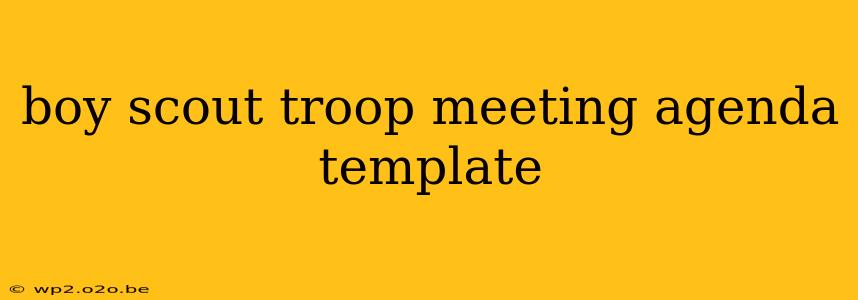Planning effective Boy Scout troop meetings is crucial for fostering a positive and productive environment. A well-structured agenda ensures everyone stays engaged and achieves the meeting's objectives. This template provides a flexible framework adaptable to different troop needs and meeting types. Remember to tailor it to your specific activities and the age group of your scouts.
I. Opening (5-10 minutes)
- Call to Order: The Scoutmaster or designated leader officially starts the meeting.
- Flag Ceremony: Includes the Pledge of Allegiance and possibly the Scout Oath and Law recitation. Rotate responsibility among scouts to build leadership skills.
- Announcements: Share upcoming events, deadlines for projects, important reminders (uniform requirements, upcoming campouts, etc.). Consider using a dedicated bulletin board for ongoing announcements.
Tips for a Smooth Opening:
- Prepare materials in advance: Have the flag, any needed props, and announcements ready beforehand.
- Keep it concise: Respect everyone's time; avoid lengthy or rambling announcements.
- Encourage participation: Involve scouts in leading parts of the opening ceremony.
II. Main Activity (45-60 minutes)
This section comprises the core of your meeting. The activity should align with your troop's overall program and the advancements your scouts are pursuing. Examples include:
- Skill Development: Knot tying, first aid, map and compass, fire building, cooking, etc. Break down complex skills into manageable steps.
- Project Work: Progress on merit badges, community service projects, or troop-level initiatives. Assign roles and responsibilities to individual scouts.
- Games and Activities: Team-building exercises, outdoor games, or simulations to reinforce skills learned.
- Guest Speakers: Invite experts in relevant fields to share their knowledge and experience.
Crafting Engaging Main Activities:
- Variety is key: Rotate activities to keep things fresh and engaging.
- Hands-on learning: Prioritize practical application over lectures.
- Differentiated instruction: Adjust activities to suit different skill levels.
- Safety first: Always prioritize the safety of the scouts during any activity.
III. Patrol Meetings (15-20 minutes) – Optional
Allow time for patrol leaders to meet with their patrols for planning and communication. This is invaluable for fostering teamwork and leadership within the patrols.
IV. Closing (5-10 minutes)
- Review: Briefly summarize what was accomplished during the meeting.
- Next Meeting Preview: Briefly discuss the agenda for the next meeting.
- Dismissal: Officially end the meeting.
Effective Closing Strategies:
- Positive reinforcement: Acknowledge individual and group accomplishments.
- Clear expectations: Ensure scouts understand what's expected of them until the next meeting.
- Time management: Adhere to the schedule and wrap up promptly.
V. Example Meeting Agenda: Knot Tying & Merit Badge Planning
Date: October 26, 2024 Time: 7:00 PM - 8:30 PM Location: Troop Meeting Room
| Time | Activity | Leader | Notes |
|---|---|---|---|
| 7:00 - 7:10 PM | Opening Ceremony | Scoutmaster | Pledge, Announcements |
| 7:10 - 7:50 PM | Knot Tying Workshop | SPL/Assistant SPL | Focus on Bowline, Clove Hitch, and Sheet Bend |
| 7:50 - 8:10 PM | Merit Badge Planning (Patrol Meetings) | Patrol Leaders | Discuss progress on chosen merit badges |
| 8:10 - 8:20 PM | Review & Next Meeting Preview | Scoutmaster | Summarize knot tying, preview next week's activities |
| 8:20 - 8:30 PM | Dismissal | Scoutmaster |
This template serves as a starting point. Remember to adapt it to your troop's unique circumstances and the specific needs of your scouts. Consistent and well-planned meetings will contribute significantly to a thriving and successful Scouting experience.

